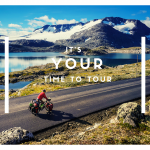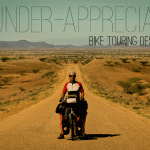
While doing research for the new Women Cycle the World website, I came across a story about a couple who had quit their jobs to go bike touring with their dog.
In the comments section I came across this:
If I quit my “Corporate America Job” to travel around the world with my wife and dog I might make it about a month before going completely broke and starting to spend my retirement. Let’s not act like this is some choice most people can make. It’s obvious these folks already had money. Travel is crazy expensive no matter what people who “just bummed around the world for a year” might tell you.
Over the years, we've heard many variations on this theme. In a nutshell, many people seem to believe the following:
Most people who can afford to go on a multi-year bicycle tour were brought up in wealth. They enjoyed educational and career opportunities out of reach for the average Joe. Youngish cycle tourists are probably living off a trust fund or handouts from well-off parents. Older bicycle travelers most certainly inherited a big chunk of money from rich relatives.
Based on the cycle tourists we've encountered over the past decade, this is far from accurate.
Our Situation
My husband is the son of a truck driver father and unskilled factory worker mother. His early years were spent in a French public housing project.* He’s the first member of his extended family to get a university education. You can bet family connections didn’t help him climb the career ladder.
I come from a solid middle-class American family. My parents both worked and they expected their children to have part-time jobs by the time they were in their teens.
Eric and I are both lucky in that we weren’t saddled with hefty student loans that burden many of today’s young adults.
The French higher education system is almost free. In 2017, students pay less than $200 in yearly fees for their Bachelor’s Degree.
I attended a state university (not very costly in the late 80’s) and was fortunate to get my degree and start my career debt-free.
So, yes, we had some advantages coming into the job market.
Other Cyclists
Young + Free
A few months back, we crossed paths with a young rider, Sam, on Adventure Cycling’s Southern Tier route in Texas. After meeting a group of cross-country bikers, Sam was so inspired to ride that he quit his $8 an hour Wal-mart job and set off on his own bike touring adventure.
Having earned just 8 bucks an hour in his previous job, Sam doesn’t have a mammoth savings account to back him up. Through strict budgeting, he stretches his limited resources as far as possible. Ramen noodles and peanut butter sandwiches are his staples. To earn extra cash, he picks up work along the way. Sam doesn’t mind camping wild and cooking all his meals. He readily accepts these ‘deprivations’ as a condition for living out his cycle touring dream.
Sam didn’t attend university. Instead, he took part in the Job Corps program and learned carpentry. The skills he obtained are a great asset in being able to pick up work along the way.
Lifestyle Choice
A woman we met bike touring in Asia works summers as a mountain guide and spends the other 9 months of the year bike touring and backpacking around the world. Most of her college friends are moving forward in their careers, getting paired up and purchasing their first homes. She’s chosen a different way to live.
Another Sort of American Dream
An American bicycle traveler we met just a few days back is taking two years off to travel the world. He’s budgeting around $50,000 for himself and his wife. He and his wife are not planning to start a family and have not purchased a home. Before beginning their adventure, they both had professional jobs in technical fields and were able to save quickly.
Early Retirement
A Spanish couple we met in India decided to ‘retire’ as soon as they hit 45. Having chosen not to raise a family, they have fewer financial responsibilities. Rental income from their home covers the expenses of their round the world bike tour. They live simply on the road but are satisfied with their chosen lifestyle.
Family on Tour
In the summer of 2016, a French couple, Adeline Reynouard and Olivier Godin, tackled the challenging Great Divide Route with their toddler in tow. They took their time but were ultimately able to traverse the entire length of the divide. They finance their tour in part by writing about their adventures but also manage their money carefully on the road.
Make Money on the Road
Lastly, there’s Jasmine Reese, an Indiana college student who set off to bike across America with her dog, violin and just $100 in her pocket. She finances her travels in part through busking.
You Can't Have Everything
Every adventurer you read about on the internet probably had to give up something important to make bike touring possible.
Most cyclists have worked hard to save money. They've scaled back their lifestyles. Some shared a modest apartment with a friend instead of living in a sprawling home. Others puttered around in a second-hand Camry instead of a fancy all-terrain vehicle. Many simply biked everywhere or relied on public transport.
Several bike touring newlyweds tied the knot at City Hall instead of springing for the cost of a lavish wedding.
I've even met a few folks who got a second job on the weekends in order to kickstart their savings.
And many people simply cut back on small things and watched their bank balances steadily grow. They sipped on Coors instead of trendy IPOs, never set foot in a Starbucks, bought generic goods at the supermarket, shopped for furniture at the local thrift shop, and purchased all their outdoor gear off e-bay.
Personally Speaking
Most people strive to one day own their own home. We have decided to go bicycle touring instead of spending money on a nice house with a big garden. Would I like to have a comfortable house in some pretty spot? Of course, I would! But in order to have a big house, we'd have to work full-time to pay for it. We can't have the house AND the decade-long bicycle tour.
By taking off touring in our income earning prime, we have committed to a lifetime of simple living. It was a conscious choice we made.
While we were working, we purchased and paid for a couple of tiny rental units in Europe. We now have a steady income stream off which we live. It's not a lot. But it's enough for us. We pay our property taxes, we pay our health insurance premiums and we pay for our daily bike touring expenses.
Saving Fast and Slow
I’ll have to admit that we were able to save for our bike tour relatively quickly. Eric’s engineering job paid well. Even my work as a freelance corporate English teacher and part-time instructor at the local technical university offered reasonable remuneration.
Bicycle travelers come from a wide range of backgrounds. Some can easily save up in a year or two enough to finance several years on the road. Others may have to work far longer to save the same amount.
Are the Trade-offs Worth It?
Of course, you’re the only one that can answer that. Most people don’t seem to regret going on a multi-year bike tour. If you’ve got a good income, no dependents, and no debt there is probably no reason not to take off on a long tour.
On the other hand, if you’re struggling to pay back student loans and sock away money to buy your first home or start a family, you may want to opt for integrating shorter weekend tours into your lifestyle. These excursions may not be the epic tour you’re dreaming of, but they can inject a dose of adventure into your daily life.
Final Verdict on Privilege
The one ‘privilege’ that most cycle tourists enjoy is being brought up in stable, developed countries with solid education systems and good economic opportunities.
A few cyclists may rely on inheritance or trust funds, but I believe they’re in the minority. Most bicycle travelers we meet have got college degrees and good job prospects. A few cyclists we meet work in low-paying jobs but still manage to tour by living on extremely limited budgets.
The bottom line is this: Round the world cyclists are just normal, everyday people from a wide range of backgrounds who decided to make bike touring a priority.
Thousands of people do it. You** (probably) can, too.
*Through hard work and careful economizing, my in-laws eventually moved their family out of public housing. They purchased a run-down house in the center of town and renovated it. The home is now listed on the national registry of historical places and features on the town’s walking tour.
** Let’s face it: some things take priority over bike touring. Caring for your kids and looking after aging parents are hefty responsibilities that usually come first. Recent graduates may also be burdened with heavy debt making it extremely tricky to wrangle a bike tour.
And yes, I know...most bicycle travelers are white. Sadly, in 2017 skin color is still linked to outcomes in life.





Well said but the budget deniers still won’t hear. Partly because they are in such a dark debt hole they can see no way out. It may be the intangibles that are the hardest to let go of. Career path, social position, prestigious home, car and family define who some people are. To let go of all of that just to become a Velo Vagabond borders on psychic suicide. But some of us would sell our home to see another persons land to become rich in mind though poor in hand. (Shakespeare?)
I think the real privilege lies in which passport you have.
Sadly, as you say, many folks are living under a mountain of debt. On the bright side, there is a growing awareness of the benefits and freedom afforded by living below your means and practicing extreme saving. Of course, you’ll have to be comfortable giving up prestige for this to work. Anybody wanting more info on extreme saving could start here:
http://www.mrmoneymustache.com/
From Wille Weirs book “Travels with Willie” page 237
Once I had a guy in his late twenties come up to me after I’d given a presentation about my five-month journey in India. Someone in the audience had asked me how much the trip had cost, and I’d stated that, excluding airfare, one thousand dollars. This guy said, “Look. I want to travel like you do. I’ll buy you dinner if I can bend your ear.” Sure. At a nearby restaurant he took out a pad and pen and said, “A thousand bucks? I can’t believe you could travel for five months on that. Tell me how?” “Well, first I need to ask you some questions.” I took out my own notebook. “Are you currently employed?” “Yeah, I work for Boeing.” “Do you have a car?” “Yes.” “Is it paid off?” “No.” “What is your payment?” I tried not to gasp when I heard his reply. I wrote the figure down. “Do you have another car? Own a house? What’s the mortgage payment?” I kept asking questions and writing down the figures from his responses. Obviously frustrated he asked, “But what does this have to do with my taking a bike trip to India?” “Everything. When I left for India I put all, and I mean all, my possessions in a friend’s closet. I had no car, no house payment, nothing. My trip through India cost one thousand dollars. Your trip through India is going to cost” … (I paused while tallying up the figures from my notebook) … “$17, 850, before you even set foot on the plane. That’s why you aren’t going to India.” He didn’t.
Weir, Willie (2011-03-08). Travels with Willie: Adventure Cyclist (pp. 237-238). Pineleaf Productions. Kindle Edition.
Hi. Thanks for the great article. I am one of those who frequently wonder if it requires a trust fund of inherited wealth to finance multiple years of travel by bike touring. You answered a lot of my questions. One thing I still wonder about is what do you do about health insurance? I mean that is about a $500/month per person expense these days and at my age (I’m 57). That’s probably the main thing that keeps me from quitting my job even though I have a decent savings and could live on part-time gigs, except that I would lose my medical benefits. Do you just go without insurance and take your chances? What happens if you get hit by a car? It could wipe you out financially without insurance. Anyway, I know this blog is old and you might not see the comment, but if you do, any insight would be appreciated.
Hi Jim,
As you pointed out, health insurance is extremely important. Our medical travel insurance plan costs us about $60 per person per month. Many people choose to travel without insurance, but we find this to be quite risky.
Really enjoyed this article! I’m glad you portrayed people in different situations who still managed to enjoy their dream – to repeal the persistent notion that only rich and privileged get to go on a multi-year bicycle tour. Like you said, it all comes down to priorities. When it comes to your passion, if you want it enough, you will find a way to live it! And then you will be the lucky one 🙂 Thanks for sharing!
Yeah, I agree with you. It’s costly to pay $60 a month for insurance purpose & most of the people are not willing to pay for travel insurance but on the other hand, it also ensures the safety issue which is more important than money. I think you got my point. Thanks!
As someone who bike tours around the world like you do, I’ll be the first to say that we are INCREDIBLY privileged. To examine this strictly from a costs perspective (“I pay this much for insurance, and owe this much money, and…”) is naive, and in reality you are privileged because you have the means to pay these fees. You’re also privileged that you can take on debt (both that someone will extend you a loan/credit, and that you know you can pay back that debt later).
Communities around the world are starving, lack access to clean water, suffer from disease, etc. and you’re writing a post to argue that you aren’t privileged. Think about that? You and I have the privilege to choose this lifestyle, and I believe that it is insensitive to write a post like this to defend our choice of recreation. All love, health, and safety to you, but we disagree.
Thanks for your comments, Chris.
If you read through the article again, I’m sure you’ll see that we do indeed AGREE.
Here’s what I say as my ‘final verdict’ on privilege:
The one ‘privilege’ that most cycle tourists enjoy is being brought up in stable, developed countries with solid education systems and good economic opportunities.
Obviously, I’m well aware of the suffering that is taking place in many parts of the world.
My post merely points out that bicycle travelers are not privileged in relation to their fellow citizens. 95% of the readers of this blog live in North America, Western Europe, and Australia and that’s the audience I’m writing to.